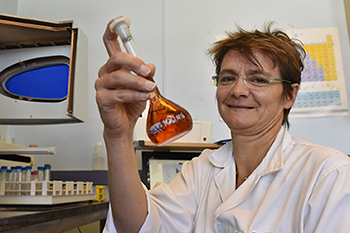Latest News Archive
Please select Category, Year, and then Month to display items
02 January 2025
|
Story Edzani Nephalela
|
Photo Lethabo Machabaphala
 From the left are, Prof John Klaasen, Dean of the Faculty of Theology and Religion; Prof Vasu Reddy, Deputy Vice-Chancellor: Research and Internationalisation at the UFS; Prof Anthea Rhoda, acting Vice-Chancellor and Principal of the UFS; Prof Allan Boesak; Prof Nico Koopman, Deputy Vice-Chancellor: Social Impact, Transformation and Personnel at Stellenbosch University; and Dr Eugene Fortein, Senior Lecturer: Historical and Constructive Theology at Prof Boesak’s book launch.
From the left are, Prof John Klaasen, Dean of the Faculty of Theology and Religion; Prof Vasu Reddy, Deputy Vice-Chancellor: Research and Internationalisation at the UFS; Prof Anthea Rhoda, acting Vice-Chancellor and Principal of the UFS; Prof Allan Boesak; Prof Nico Koopman, Deputy Vice-Chancellor: Social Impact, Transformation and Personnel at Stellenbosch University; and Dr Eugene Fortein, Senior Lecturer: Historical and Constructive Theology at Prof Boesak’s book launch.
In a world increasingly defined by the stark contrasts of power and vulnerability, the concept of democracy often reveals itself as a double-edged sword. For the children of struggle – those who have grown up amid the chaos of inequality and conflict – democracy can feel like a distant promise, an ideal often outmanned by the realities they face. The deception of hope lingers in the air as aspirations clash with systemic barriers, leaving many to navigate a landscape where a harsh daily existence obscures the principles of freedom and justice. This exploration seeks to uncover the intricate dynamics between hope and disillusionment, shedding light on the lived experiences of those who yearn for a brighter future yet grapple with the weight of unfulfilled promises.
This was the essence of the public lecture titled Outmanned by Democracy: Children of Struggle, Deception, and Hope, presented by Prof Allan Boesak, a theologian and political activist, on the Bloemfontein Campus.
Prof Boesak confronted the continuous socio-economic challenges faced by South Africa and other nations, including racism, narrow ethnic nationalism, and the revival of tribalism. He emphasised the role of churches in tackling these issues. “The responsibility of churches is to articulate what politicians are often afraid to say,” he stated. “Put your ideologies into practice and leverage your power as ministers of the Word to shape the future and reclaim the dignity of your people. This is where unity transcends colour and stature. Consider the various roles that churches could play in reconciling communities, as seen in the Gaza crisis.”
During his visit to the UFS Faculty of Theology and Religion, Prof Boesak also launched a four-volume set titled The Fire, The River and the Scorched Earth: Fifty Years of Black Theology Through the Lens of Allan Boesak. The first three volumes include his lectures and responses from various theologians, while the fourth contains his sermons. This body of work aims to document, critique, and celebrate the contributions of black theology, highlighting its role in the struggle for justice and liberation and underscoring Prof Boesak’s unwavering commitment to freedom, liberation, and democracy.
In a time when hope and disillusionment coexist, Prof Boesak’s insights remind us of the transformative power of faith and activism in the continuing fight for a more equitable world
UFS Ground Studies Laboratory receives accreditation to international standard
2016-03-18

Lore-Mari Deysel, Deputy-Director of the institute for Groundwater Studies.
Photo: Charl Devenish |
The Institute for Groundwater Studies (IGS) Laboratory at the University of the Free State is on equal footing with international testing labs. With its accreditation in March 2016 by SANAS (South African National Accreditation System), the IGS Laboratory now officially meets global standards.
Quality of water
The IGS Laboratory mainly analyses the quality of water samples. When it was originally established in 1989, the lab’s central function was to conduct testing for researchers at the institute itself. “After the public and water boards realised their need to analyse water samples, the IGS Laboratory expanded to deliver a service to these clients,” says Lore-Mari Deysel, Deputy-Director of the institute.
Since suppliers and regulatory authorities will not accept test or calibration results from a lab that is not accredited, the IGS initiated the accreditation process.
Accreditation to international standard
In order to be deemed technically competent and able to receive accreditation, labs must meet the ISO/IEC 17025 standard. ISO/IEC 17025 was first issued in 1999 by the ISO (International Organization for Standardization) and the IEC (International Electrotechnical Commission).According to Deysel, this is the single most important standard for calibration and testing laboratories around the world.
“Laboratories that are accredited to this international standard have demonstrated that they are technically competent and able to produce precise and accurate test and/or calibration data. Furthermore, it demonstrates that the university has the capacity to supply valuable and reliable services alongside the academy,” Deysel says.